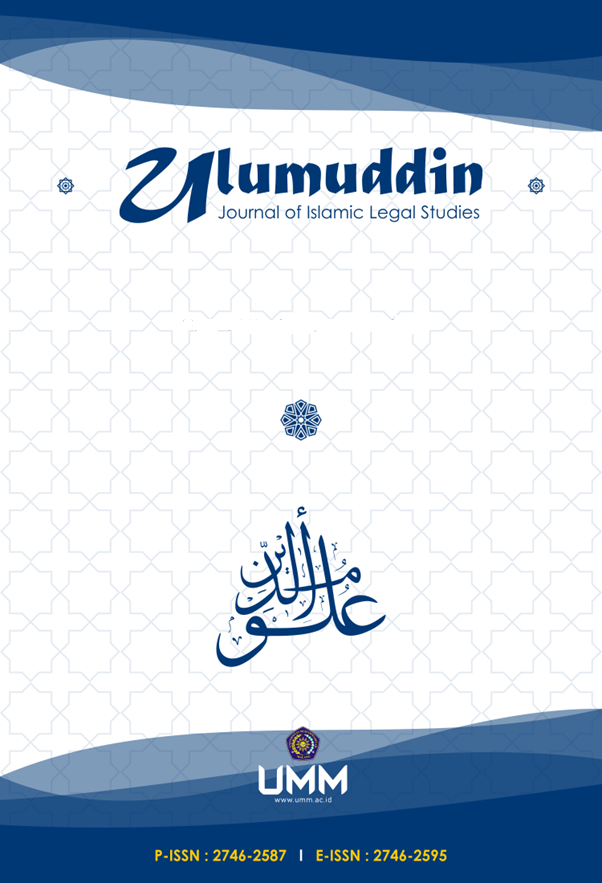Marriage Dispensation Provision in the Pregnant Situation Based on Maqashid Al-Shariah Perspective (Case Study of Malang Religious Court)
Keywords:
Marriage Dispensation, Maqashid Al-SyariahAbstract
In a marriage dispensation rules in Act No. 1 of 1974 on the marriage did not mention what can be used as the basis for an important reason, such as an urgent need for the sake of the family, then the dispensation can be given. Due to the failure to mention an important reason, then easily just everyone getting dispensation such that every law also serves to protect human benefit by grasping the principles which not only protects human benefit individually, but also human welfare in the family, community, people and nature as well as the concept of Maqasid al Syariah. Researchers will explore the consideration of the judge regarding the granting of marriage dispensation. Therefore, the researchers used field research with qualitative approach by means of direct interview to the informants and the literature of several books. From the research, it is known that judges of Malang Religious Court that the considerations underlying the granting of marriage dispensation in the state of pregnancy is an element of urgency and welfare. Then, when viewed from the concept of Maqasid al-shariah that granting the dispensation of marriage has put the four points of the Maqasid al-shariah. Namely, ḥifẓ nasl, ḥifẓ nafs, ḥifẓ aql, ḥifẓ maal. While ḥifẓ din adultery should receive legal punishment as a lesson to the perpetrators and others.
Downloads
References
Al-Quran.
As-Sunnah.
Undang-undang Nomor 1 Tahun 1974 tentang Perkawinan.
Kompilasi Hukum Islam.
Undang-undang Nomor 23 Tahun 2002 tentang Perlindungan anak.
PMA Nomor 3Tahun 1975
‘Audah, Jaser. (2013). Al-Maqashid untuk pemula. Yogyakarta: SUKA-Pres UIN Sunan Kalijaga.
Arikunto, Suharsimi. (1993). Prosedur Penelitian Suatu Pendekatan Praktik, Jakarta: Bineka Cipta.
al-Asyqar, Umar Sulaiman. (2015). Pernikahan Syar’i. Surabaya: Tiga Serangkai.
Amin Suma, Muhammad. (2005). Hukum Keluarga Islam di Dunia Islam, Jakarta: Rajawali
Penelitian Sosial: Format-Format Kualitatif dan Kuantitatif. Surabaya: Lepkis. Press.
Asafri Jaya Bakri. (1996). Konsep Maqashid Syari’ah Menurut Al-Syatibi, (Jakarta: PT. Raja Grafindo Persada.
Bugin, Burhan. (2001). Metodologi
Chuzaimah Tahido Yanggo dan Hafis Anshary AZ. (1994). Problematika
Hukum Islam Kontemporer Buku Pertama, Jakarta: LSIK. ix
Cik Hasan Bisri. (1998). Peradilan Agama di Indonesia, Jakarta: PT Raja Grafindo Persada.
Hadikusuma, Hilman. (1990). Hukum Perkawinan Indonesia, Bandung: Mandar Maju.
Idris Ramulyo, Mohd. (1999). Hukum Perkawinan Islam, Jakarta: Bumi Aksara.
Imam Mawardi, Dr. Ahmad. (2010). Fiqih Minoritas, Yogyakarta: LKiS Yogyakarta.
Muhammad, KH. Husein. (2001). Fiqih Perempuan, Yogyakarta: LkiS Yogyakarta.
Muhdlor, A. Zuhdi. (1994). Memahami Hukum Perkawinan. Bandung: Al Bayan.
Prodjohamidjojo. MR Martiman. (2011). Hukum Perkawinan Indonesia, Jakarta: Indonesia Legal Center Publishing.
R. Subekti dan R. Tjitrosoedibio. (1996). Kamus Hukum. Jakarta: PT. Pranadya Paramita.
Soemiyati. (1989). Perkawinan Islam dan Undang-Undang Perkawinan, Yogyakarta: Liberty.
Saleh, K. Wantjik. (1976). Hukum Perkawinan Islam. Jakarta: Ghalia Indonesia.
Soemiyati. (1989). Perkawinan Islam dan Undang-Undang Perkawinan, Yogyakarta: Liberty.
Syarifudin, Amir. (2011). Ushul Fiqh Jilid 1, Jakarta: Prenada Media Grup
Tholabi Kharlie, Dr. Ahmad. (2013). Hukum Keluarga Indonesia. Jakarta: Sinar Grafika.
Yunus, Muhammad. (1964). Hukum Perkawinan dalam Islam, Jakarta: CV. Al-Hidayah.
W.F. Mramis dan Piet go.o Charm, dkk. (1991). Malang: DIOMA Malang
Published
How to Cite
Issue
Section
License

This work is licensed under a Creative Commons Attribution-ShareAlike 4.0 International License.



















